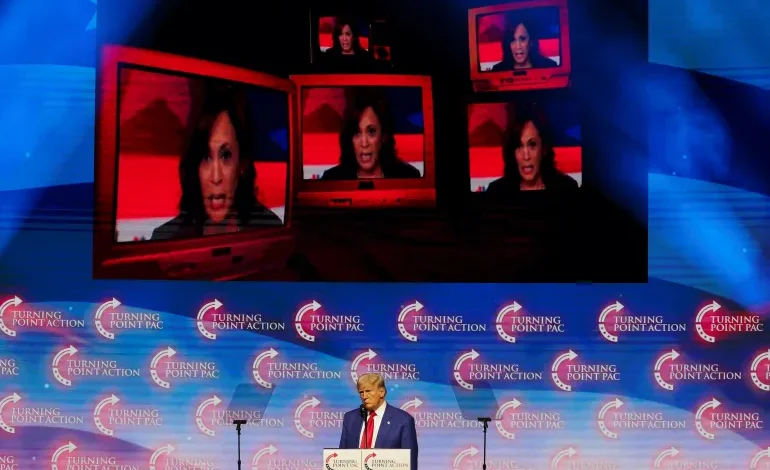What is the history of newspaper endorsements and can they swing elections?

Decisions by the billionaire owners of two leading newspapers to end their longstanding practice of endorsing the Democratic presidential candidate have prompted a backlash days before a neck-and-neck United States presidential election on November 5.
The owners of The Washington Post and the Los Angeles Times blocked moves by their staff for the newspapers to back Democratic Kamala Harris against Republican runner Donald Trump, breaking with a decades-long tradition of picking a side.
The Washington Post, owned by billionaire Jeff Bezos, founder and owner of Amazon, said the decision was taken to safeguard independent reporting.
“Our job as the newspaper of the capital city of the most important country in the world is to be independent. And that is what we are and will be,” Bezos said.
Days earlier, another billionaire owner had taken a similar step. Patrick Soon-Shiong, a biotech tycoon and owner of the LA Times, overruled the paper’s editorial decision to endorse Harris.“The process was [to decide]: how do we actually best inform our readers” while leaving it to them to make the final decision, Soon-Shiong said in an interview with the newspaper.
Why did the papers stop endorsements and what was the reaction?
The owners of both news outlets said their decisions were aimed at protecting independent reporting and giving readers the freedom to make their own choices.
However, several observers have expressed concern that their owners’ business interests may be playing a role.
Former Washington Post editor Marty Baron accused the newspaper of giving in to intimidation from the Republican camp. “This is cowardice, with democracy as its casualty,” Baron wrote on X.
In a swipe at the management’s decision, the paper’s cartoon page editors on Saturday published an image of a streak of dark paint titled “Democracy dies in darkness”, the daily’s slogan featured below its masthead.
Critics of the decisions say Bezos and Soon-Shiong have business interests that may be influenced by Trump’s possible re-election, with the founder of Amazon holding shares in companies with substantial contracts with the US administration and the LA Times owner wanting to promote new drugs that require approval from the Food and Drug Administration.
Dan Kennedy, a journalism professor at Northeastern University, said Bezos and Soon-Shiong were engaging in “anticipatory obedience”.
What is the history of political endorsements by newspapers?
Newspaper endorsements in the US date back to the Chicago Tribune’s support of Abraham Lincoln in 1860.
The Post began its tradition of endorsement 48 years ago when it voiced its support for Democrat Jimmy Carter. Its publisher and CEO, William Lewis, said last week that the newspaper would, from now on, cease to back a candidate and return to its tradition of non-endorsement.
“We had it right before that, and this is what we are going back to,” said Lewis.
The LA Times suspended presidential endorsements from 1976 to 2004. But in 2008, it backed Democrat Barack Obama and has continued the practice since.
Some outlets have already scaled back the practice. The New York Times, for example, no longer makes state and local endorsements but continues to do so in national races.
While no official count exists of newspaper endorsements, the Republican-leaning Fox News and other outlets estimated that nearly 80 newspapers had endorsed Harris while fewer than 10 endorsed Trump in this run-up to the election.
Trump did win the backing of The Washington Times and the New York Post, a tabloid owned by Australian-American business magnate Rupert Murdoch. Harris, for her part, won endorsements from The New York Times, The Boston Globe, Rolling Stone magazine and The Philadelphia Inquirer, among others.
Why do newspapers endorse political candidates?
Newspapers justify endorsements as a “service” to readers, to whom, they say, they provide informed guidance based on careful analysis of the candidates.
Endorsements signal the ideological stance of the newspaper but are also thought of as an expert opinion and indicator of candidate quality.
In his statement, Lewis, the Post CEO, portrayed the newspaper’s decision not to back Harris as “a statement in support of our readers’ ability to make up their own minds on this, the most consequential of American decisions – whom to vote for as the next president”.
Dominic Wring, professor of political communication at the United Kingdom’s Loughborough University, said newspaper endorsements play a prominent role in shaping public opinion to this day.
“It’s not that the media tell us what to think, but they indicate what we should think about,” he told Al Jazeera. “This story is indicative of the way established media brands, albeit in a very fragmented media landscape, command the loyalty and interest of an engaged public.”
During that time, when most newspaper endorsements were for Republican candidates, Sprick Schuster calculated that they were responsible for shifting more than 20 million voters towards the red camp.
However, in his study, he conceded it was “also possible that endorsements simply expedited a change that would have occurred anyway … Perhaps endorsements are simply changing when a person decides to support a specific candidate without changing the identity of who someone will support,” he wrote.
Wring said for the current presidential vote, where the race is so tight, the endorsement of leading US newspapers has acquired an even greater relevance in swinging the vote. “I’m sure Harris’s team will want anything and everything to be aligned with what they are saying,” he said.
The Post and the LA Times owners likely took a “calculated risk”, Wring added, and are banking on being able to rekindle the relationship with Harris more easily than they would if Trump were to be elected president.
Do other countries have a tradition of newspaper endorsements?
In the 1992 election, when then-Prime Minister John Major won the fourth consecutive time, The Sun newspaper claimed its endorsement had swung the election.
“It’s The Sun wot won it,” its front-page headline read the following morning. The headline went down in UK political history as proof of how powerful newspaper endorsement can be.
The phrase re-emerged in 1997 – when The Sun endorsed Tony Blair’s Labour Party and it won a landslide Labour victory in the general election.
In 2009, The Sun officially switched its endorsement back to the Conservative Party with the headline “Labour’s lost it”. The Conservative Party won the general election the following year and remained in power for 14 years.










